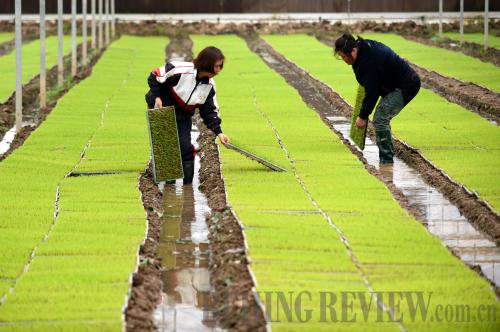|
 |
|
SOWING HOPES: Farmers in Xinjian County, Jiangxi Province, manage rice seedlings in March. The slack in grain planting has led to growing concerns by the Central Government (ZHOU KE) |
Agriculture is an important foundation for China's economic and social development, and grain security for 1.3 billion Chinese is the top priority of the government. This year, farm produce price fluctuations upset the planting and breeding industries, imposing tremendous pressure on the Chinese Government. On May 13, the Ministry of Agriculture (MOA) sent seven work groups to six major agricultural provinces across the country to help guide spring ploughing, pig raising and recovery of farm production in an earthquake-affected area in Sichuan.
According to MOA figures, China's farm production this year isn't in good shape. In terms of grain planting, a total of 57.13 million hectares of cropland had been sown by May 9, a decline of 6 percentage points from last year. Of the total, 37.87 million hectares of grain land was sown, completing 60.2 percent of the planned acreage, which was 7.7 percentage points lower than a year ago; 3.2 million hectares of oil crop land was sown, accounting for 46.6 percent of the planned acreage and dropping by 4.3 percentage points than the same period last year. The breeding of pigs, which imposes the most direct influence on the consumer price index (CPI), seemed to face tremendous difficulty: Because pork prices kept dropping for two months while feedstuff prices remained unchanged, a farmer lost 200 yuan ($32.26) for each head of pig he fed.
Du Zhixiong, Deputy Director of Rural Development Institute at the Chinese Academy of Social Sciences, said there are many reasons to explain China's gloomy agricultural situation. For one, the income from planting grain and breeding is lower than what farmers may earn as migrant workers in cities, leaving many to abandon farm work. Natural disasters and animal epidemic diseases also occurred in some areas, and the April 20 earthquake in Lushan, Sichuan Province, seriously impacted local agricultural production.
"To prevent demand and supply as well as the prices of farm produce from fluctuating wildly is an urgent need for present agricultural situation. The government should thereby shore up the confidence of farmers, promote sustained and sound economic development and increase farmers' income," Du said.
Government measures
At a State Council executive meeting chaired by Premier Li Keqiang on May 8, the cabinet discussed ways to boost agricultural production and ensure market supplies and stable prices.
According to a report from gov.cn, the meeting concluded with five measures needed to ensure the stable prices of farm produce. First, local governments must better manage the sowing of grain crops in order to create the favorable conditions needed for a bumper harvest in the coming fall. Second, related government departments must support the large-scale production of pigs. Third, large-scale breeding farms are needed to increase supplies of beef and mutton. Fourth, the State Council will further expand the poultry industry. Fifth, a recovery is needed in the Lushan earthquake-affected area to restore facilities and farmland destroyed by the quake.
|
